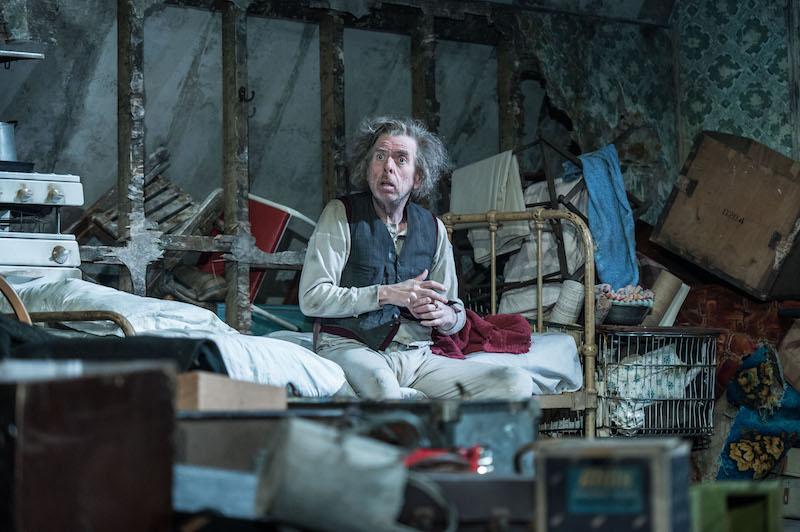The Caretaker, Old Vic | reviews, news & interviews
The Caretaker, Old Vic
The Caretaker, Old Vic
Timothy Spall leads an empathetic but overly broad Pinter revival

It’s raining. Well, of course – it’s April in London. But it’s also pouring down on the Old Vic stage, hammering an already battered slate roof. When it lifts to reveal the semi-derelict attic, site of Harold Pinter’s groundbreaking 1960 play, the rain stays in your mind: an outside world that can be merciless towards the weak. And in Matthew Warchus’s revival, the trapped trio are very much victims – of one another, of society, and of their own failings.
This is Pinter writ large and with great empathy, if not subtlety. Rob Howell’s beautifully detailed junkyard is a dilapidated period treasure trove, from the precarious stack of newspapers to the rusting gas stove, dismembered furniture, mouldering boxes and peeling wallpaper. It’s the perfect backdrop for the larger-than-life turn from Timothy Spall, who makes a welcome return to the stage. (Spall pictured below with George MacKay)
 Davies, his invasive, perennially ungrateful tramp, is somewhere between Dickensian grotesque, fastidious dandy and vaudevillian clown, with a shock of grey hair, eloquent physicality – the florid hand gestures are a marvel – and richly musical speech. He plays to an audience, whether he has one or not, and makes a comic meal out of every line, grunt and gesture: modelling a smoking jacket, “helping” by lifting a blanket half an inch, rejecting a patterned shirt with a contemptuous cry of “Check?”
Davies, his invasive, perennially ungrateful tramp, is somewhere between Dickensian grotesque, fastidious dandy and vaudevillian clown, with a shock of grey hair, eloquent physicality – the florid hand gestures are a marvel – and richly musical speech. He plays to an audience, whether he has one or not, and makes a comic meal out of every line, grunt and gesture: modelling a smoking jacket, “helping” by lifting a blanket half an inch, rejecting a patterned shirt with a contemptuous cry of “Check?”
It’s a performance that could easily dominate, but Daniel Mays and George MacKay, as the damaged man who offers shelter and his aggressive brother respectively, are a match for Spall’s theatrics. MacKay’s Mick, in all-black attire and slicked-back hair, is a feline ninja, watching from the shadows and suddenly springing into attack. He takes his speeches at a gallop, peppering his victim with bewildering patter, in sharp contrast to the halting delivery of Mays’s hunched, broken Aston (pictured below).
 Yet all three yearn for connection, even as they alienate those around them. Warchus emphasises their neediness, and the tragedy of grand plans unfulfilled: Davies’s faith in the magic of faraway Sidcup, Aston’s dream of a shed, Mick’s hopes for redecorating and money-making. None are able to offer comfort or even listen to one another. In a mesmeric sequence, Aston reveals his horrifying experience of forced ECT in a mental hospital, but – emphasised by the light falling everywhere but Aston – he remains trapped in isolation. Davies can only use such information as a means of attack, flipping from fake ingratiation to bitter aggression and thus bringing about his own ruin.
Yet all three yearn for connection, even as they alienate those around them. Warchus emphasises their neediness, and the tragedy of grand plans unfulfilled: Davies’s faith in the magic of faraway Sidcup, Aston’s dream of a shed, Mick’s hopes for redecorating and money-making. None are able to offer comfort or even listen to one another. In a mesmeric sequence, Aston reveals his horrifying experience of forced ECT in a mental hospital, but – emphasised by the light falling everywhere but Aston – he remains trapped in isolation. Davies can only use such information as a means of attack, flipping from fake ingratiation to bitter aggression and thus bringing about his own ruin.
But Warchus shies away from the lurking darkness of Pinter’s play. Even when they’re locked in a three-way power struggle, he foregrounds the fact that these men are, variously, destitute, socially excluded, demonised, forgotten – a resonant reading of economic divide. But MacKay’s high-speed delivery, if bravura enough to draw applause, takes some of the bite out of his bullying and suggests an underlying insecurity, while Spall makes Davies’s needling, wheedling and racism pitiful character flaws in an often charming rogue. Though somewhat bloated at three hours (with two intervals), it’s a busy production, lacking loaded silences and ominous ambiguity. A thoroughly engaging version of this Irving Wardle-dubbed “comedy of menace”, but skewed too much towards the former.
rating
Explore topics
Share this article
The future of Arts Journalism
You can stop theartsdesk.com closing!
We urgently need financing to survive. Our fundraising drive has thus far raised £49,000 but we need to reach £100,000 or we will be forced to close. Please contribute here: https://gofund.me/c3f6033d
And if you can forward this information to anyone who might assist, we’d be grateful.

Subscribe to theartsdesk.com
Thank you for continuing to read our work on theartsdesk.com. For unlimited access to every article in its entirety, including our archive of more than 15,000 pieces, we're asking for £5 per month or £40 per year. We feel it's a very good deal, and hope you do too.
To take a subscription now simply click here.
And if you're looking for that extra gift for a friend or family member, why not treat them to a theartsdesk.com gift subscription?
more Theatre
 Wendy & Peter Pan, Barbican Theatre review - mixed bag of panto and comic play, turned up to 11
The RSC adaptation is aimed at children, though all will thrill to its spectacle
Wendy & Peter Pan, Barbican Theatre review - mixed bag of panto and comic play, turned up to 11
The RSC adaptation is aimed at children, though all will thrill to its spectacle
 Hedda, Orange Tree Theatre review - a monument reimagined, perhaps even improved
Scandinavian masterpiece transplanted into a London reeling from the ravages of war
Hedda, Orange Tree Theatre review - a monument reimagined, perhaps even improved
Scandinavian masterpiece transplanted into a London reeling from the ravages of war
 The Assembled Parties, Hampstead review - a rarity, a well-made play delivered straight
Witty but poignant tribute to the strength of family ties as all around disintegrates
The Assembled Parties, Hampstead review - a rarity, a well-made play delivered straight
Witty but poignant tribute to the strength of family ties as all around disintegrates
 Mary Page Marlowe, Old Vic review - a starry portrait of a splintered life
Tracy Letts's Off Broadway play makes a shimmeringly powerful London debut
Mary Page Marlowe, Old Vic review - a starry portrait of a splintered life
Tracy Letts's Off Broadway play makes a shimmeringly powerful London debut
 Little Brother, Soho Theatre review - light, bright but emotionally true
This Verity Bargate Award-winning dramedy is entertaining as well as thought provoking
Little Brother, Soho Theatre review - light, bright but emotionally true
This Verity Bargate Award-winning dramedy is entertaining as well as thought provoking
 The Unbelievers, Royal Court Theatre - grimly compelling, powerfully performed
Nick Payne's new play is amongst his best
The Unbelievers, Royal Court Theatre - grimly compelling, powerfully performed
Nick Payne's new play is amongst his best
 The Maids, Donmar Warehouse review - vibrant cast lost in a spectacular-looking fever dream
Kip Williams revises Genet, with little gained in the update except eye-popping visuals
The Maids, Donmar Warehouse review - vibrant cast lost in a spectacular-looking fever dream
Kip Williams revises Genet, with little gained in the update except eye-popping visuals
 Ragdoll, Jermyn Street Theatre review - compelling and emotionally truthful
Katherine Moar returns with a Patty Hearst-inspired follow up to her debut hit 'Farm Hall'
Ragdoll, Jermyn Street Theatre review - compelling and emotionally truthful
Katherine Moar returns with a Patty Hearst-inspired follow up to her debut hit 'Farm Hall'
 Troilus and Cressida, Globe Theatre review - a 'problem play' with added problems
Raucous and carnivalesque, but also ugly and incomprehensible
Troilus and Cressida, Globe Theatre review - a 'problem play' with added problems
Raucous and carnivalesque, but also ugly and incomprehensible
 Clarkston, Trafalgar Theatre review - two lads on a road to nowhere
Netflix star, Joe Locke, is the selling point of a production that needs one
Clarkston, Trafalgar Theatre review - two lads on a road to nowhere
Netflix star, Joe Locke, is the selling point of a production that needs one
 Ghost Stories, Peacock Theatre review - spirited staging but short on scares
Impressive spectacle saves an ageing show in an unsuitable venue
Ghost Stories, Peacock Theatre review - spirited staging but short on scares
Impressive spectacle saves an ageing show in an unsuitable venue
 Hamlet, National Theatre review - turning tragedy to comedy is no joke
Hiran Abeyeskera’s childlike prince falls flat in a mixed production
Hamlet, National Theatre review - turning tragedy to comedy is no joke
Hiran Abeyeskera’s childlike prince falls flat in a mixed production

Add comment